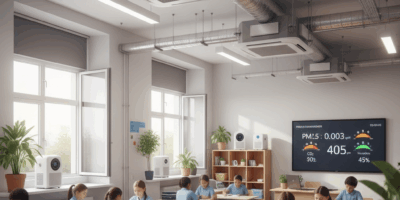How to Protect Your Home from NW Air Pollution
Pacific Northwest air pollution has gotten complicated with all the wildfire seasons, urban smog, and everything else floating around out there. As someone who’s lived through a few nasty smoke events in the Seattle area, I learned everything there is to know about keeping bad air out of my house. Today, I will share it all with you.
Understanding What You’re Actually Dealing With

First thing — know your enemy. Around here, air pollution comes from three main sources: wildfires (obviously), vehicle exhaust from all that I-5 traffic, and industrial stuff floating over from various facilities. The particulate matter and gases from this mix will absolutely find their way inside your home if you don’t take steps to stop it.
Sealing Up Your Home (It Works)
Probably should have led with this section, honestly. Your house has way more gaps and cracks than you’d think. Start checking around windows and doors — that’s where most of the outside air sneaks in. Weather stripping and caulk are your friends here. Draft stoppers under doors help too. And don’t forget about vent openings — make sure they’re properly screened.
The Filter Situation

This is where spending a bit more money actually pays off. HEPA filters for your HVAC system catch the tiny particles that regular filters miss. You do need to change them regularly — check what the manufacturer says about timing. And portable air purifiers with HEPA filters? Absolute lifesavers during wildfire season when you need to clean up the air in your bedroom or wherever you spend the most time.
Ventilation Gets Tricky
Here’s the thing about ventilation — it’s good for indoor air quality, but not when the outdoor air is garbage. On heavy pollution days, keep windows and doors shut. Run exhaust fans in kitchens and bathrooms to deal with humidity and cooking fumes. If you want a longer-term solution, an energy recovery ventilator (ERV) pulls in fresh air while filtering out the bad stuff.
Houseplants Actually Do Something
Not just for decoration. Spider Plants, Snake Plants, and Peace Lilies absorb toxins and clean the air a bit. Spread a few around your house. They won’t replace a real air purifier, but they help, and they look nice while doing it.
Cleaning Matters More Than You’d Think
Dust and vacuum often — particulate matter settles on everything. Use a vacuum with a HEPA filter so you’re actually trapping stuff instead of just blowing it around. When wiping surfaces, use a damp cloth. Those feather dusters just put dust back in the air. Wash your bedding and curtains regularly too — they collect more particles than you’d expect.
Watch What You Bring Inside
Strong chemical cleaners and air fresheners? They’re polluting your indoor air. Natural cleaning products and essential oils work fine for most things. When you do use paint or adhesives, make sure you’ve got good ventilation going. Keep up with HVAC maintenance to prevent mold and dust buildup in the system itself.
Fireplace Reality Check
Fireplaces are cozy, but they create indoor pollution if you’re not careful. Use well-seasoned wood to cut down on smoke. Keep the flue open when burning. Get the chimney cleaned regularly to prevent creosote buildup and keep air flowing properly.
Actually Monitoring Your Air
Air quality monitors tell you what’s really happening inside your home. Some will alert you when pollution spikes. The fancier smart systems can even adjust your HVAC settings automatically based on readings. Worth the investment if you’re serious about this stuff.
When to Call in Help
If you’ve done all this and your air quality still tests poorly, talk to a professional. Air quality specialists can pinpoint specific pollutants and suggest solutions — maybe better filtration, better sealing, or even some structural changes depending on your situation.
Quick list of the basics:
- Seal gaps around windows and doors
- Get HEPA filters for your HVAC and maybe a portable purifier
- Add some houseplants for natural filtration
- Clean regularly with a HEPA vacuum
- Ventilate smart — open when air is good, closed when it’s not
That’s what makes indoor air quality endearing to us PNW folks — we actually have to think about it. Take these steps consistently and you’ll notice the difference, especially during smoke season.



